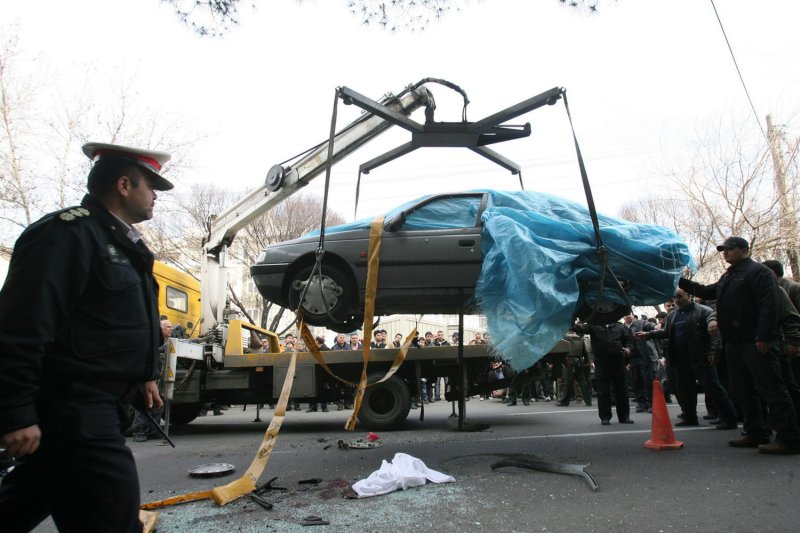1 of 2 | Iranian policemen and people stand around the blast site that killed nuclear scientist Mostafa Ahmadi Roshan in Tehran on January 11, 2012. Iran officials have compared the incident to the assassination attempts in the last two years on three other Iranian scientists who also worked on nuclear projects. UPI/Meghdad Madadi/ Fars News Agency |
License Photo
DUBAI, United Arab Emirates, Jan. 11 (UPI) -- The assassination of an Iranian nuclear scientist in Tehran, allegedly by Israel's Mossad intelligence service, has supercharged tensions in the Persian Gulf where Iran is threatening to close the strategic Strait of Hormuz, a key oil artery.
At the same time, the leading French newspaper Le Figaro reported the Mossad is training Iranian dissidents in Iraqi Kurdistan to carry out bombings inside Iran to destabilize the country.
The Mossad has long operated in that region and has supported Kurdish rebels who fought the Baathist government in Baghdad since the 1970s.
There was no suggestion it was Israeli-trained Iranians who were behind Wednesday's assassination in Tehran.
But the slaying of the scientist, identified by the semiofficial Fars news agency as Mostafa Ahmadi-Roshan, 32, bore a striking resemblance to the assassination of several other nuclear scientists over the last two years.
Ahmadi-Roshan, who reportedly headed a department at the Natanz uranium enrichment facility in Isfahan province, central Iran, was killed when a motorcyclist attached a magnetic bomb to his car as he drove through the Iranian capital.
At least two other scientists were killed in similar attacks in 2010-11 by assassins riding motorcycles. A third was shot dead by two gunmen firing from motorcycles in July 2011.
All those killings were blamed on the Mossad, which reportedly unleashed a campaign of assassination and sabotage against Iran's contentious nuclear program eight years ago under Director Meir Dagan, a former army general notorious for deadly clandestine operations since the 1970s.
All told, at least four scientists linked to Tehran's nuclear program, which the West alleges masks a drive to develop nuclear weapons, have been murdered since 2007.
Wednesday's attack will incense Iran's leadership amid an escalation in the confrontation in the gulf as the West tightens economic sanctions against the Islamic Republic.
These were imposed by the U.N. Security Council in June 2010 over Tehran's refusal to halt uranium enrichment, the core of the process involved in developing nuclear weapons. Iran says its program is aimed at producing nuclear power.
Iran has threatened to close the Strait of Hormuz if the United States and the European Union target the republic's central bank, which handles oil transactions, and thus threaten the country's vital oil exports.
Sealing off the 112-mile waterway at the southern end of the gulf would cut off at least 20 percent of the world's oil supplies. That would send oil prices skyrocketing and trigger a global economic slump.
U.S. President Barack Obama approved sanctions against the central bank Dec. 25. The EU is expected to do so Jan. 30. This has sent Iran's currency spiraling downward, dramatically heightening the impact of the sanctions.
Many analysts say that leaves the Iranian leadership with little room for maneuver amid fears Israel will launch pre-emptive strikes and Obama, running for re-election in November, may be inclined to take military action himself.
"If a breakthrough in negotiations fails to materialize, the likelihood of an explosion of violence increases," observed Israel-based analyst Victor Kotzev.
With Iranian and U.S. forces in the region, particularly the U.S. 5th Fleet based in Bahrain, on alert and engaged in provocative, muscle-flexing exercises the tension grows daily.
"Even a fairly minor incident could trigger a major confrontation," Kotzev noted in a Jan. 4 analysis.
He argued that with the Iranian leadership increasingly squeezed into a corner, "this makes war an attractive option for them. In some ways, an American or Israeli attack would be a political blessing to them as it would rally domestic support."
Some Western observers write off the Iranian threat to Hormuz as little more than bluff and bluster, since Iran's oil exports would be cut off with those of the gulf's Arab producers.
Russia and China have stood by Iran throughout the crisis. But China, along with Iran's other major oil customers in Asia, like India, appear to fear the worst and are seeking alternative sources of supply.
Russia, too, seems to be backing off. In a gravely worded announcement Tuesday, Moscow expressed "regret" at Tehran's decision to activate a new uranium enrichment plant near Qom, south of Tehran.
The Russians made clear they feel Iran would have itself to blame if trouble comes its way and urged Tehran to commence "serious negotiations … without preconditions."





